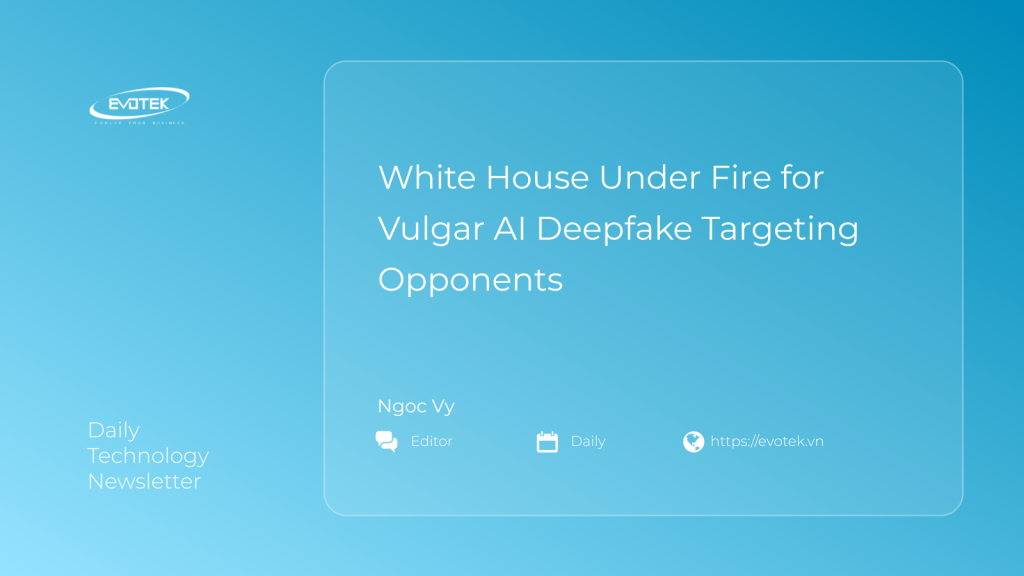In an era where artificial intelligence blurs the lines between reality and fabrication, the integrity of information stands at a critical juncture. The proliferation of large language model “hallucinations,” sophisticated vocal deepfakes, and increasingly convincing video deepfakes presents a significant challenge to the public’s ability to discern truth. This danger is particularly acute within the political landscape, where manipulated media can be weaponized to distort perceptions and influence public opinion.
Amidst this volatile environment, senior elected officials are expected to uphold standards of truth and demonstrate responsible use of emerging technologies. However, recent actions from the highest office have raised serious concerns about the weaponization of AI-generated misinformation in political discourse.
President Posts Offensive AI Deepfake
On a recent Monday night, the President of the United States, with access to unparalleled intelligence resources, posted a 35-second AI-generated video to his Truth Social account. This video, described as containing crude insults, racial overtones, and bizarre conspiracy theories, specifically targeted two prominent Democratic leaders. The incident occurred while these leaders were engaged in sensitive budget negotiations with the President, casting a shadow over the prospects of bipartisan cooperation.
The controversial clip depicted a manipulated version of Senator Chuck Schumer (D-NY) delivering a surreal, expletive-laden monologue. His colleague, Representative Hakeem Jeffries (D-N.Y.), was also featured, adorned with a CGI sombrero, while mariachi music played in the background. Adding to the absurdity, the deepfake version of Schumer was also given a fake mustache. Critics quickly pointed out the video’s blatant disregard for responsible political engagement, likening the use of such deepfake technology to a new, unsettling “art of the deal.”
Unpacking the Deepfake’s Disturbing Narrative
The fabricated dialogue attributed to Senator Schumer in the video was deeply divisive and rooted in false narratives. Here is the full, disturbing quote from the AI-generated segment:
“Look, guys, there’s no way to sugarcoat it. Nobody likes Democrats anymore. We have no voters left because of all of our woke trans bullshit. Not even Black people want to vote for us anymore. Even Latinos hate us. So we need new voters. And, if we give all these illegal aliens free health care, we might be able to get ’em on our side so they can vote for us. They can’t even speak English, so they won’t realize we’re just a bunch of woke pieces of shit, you know, at least for a while until they learn English and realize they hate us, too.”
This dialogue not only contains offensive language and racial stereotypes but also propagates unfounded conspiracy theories regarding voter fraud and illegal immigration. It falsely suggests that non-citizens can vote in U.S. elections and would be swayed by political incentives.
Fact-Checking False Claims on Voter Eligibility
It is crucial to clarify that individuals residing in the U.S. illegally are unequivocally barred from voting in federal or state elections. Furthermore, instances of non-citizens attempting to vote are exceedingly rare. For example, a 2024 audit conducted by Republicans in Georgia meticulously examined 8.2 million registered voters and found that only 20 individuals were not U.S. citizens. Of these, 11 had no history of casting a ballot despite being registered.
Such data underscores the falsity of the claims embedded within the President’s AI deepfake, highlighting the deliberate nature of the misinformation campaign.
The Peril of Normalizing Political Deepfakes
The President’s decision to disseminate this AI-generated video marks a dangerous normalization of deepfakes within mainstream political discourse. In a world where truth is increasingly difficult to pin down—a phenomenon exemplified by the misattribution of the popular adage, “a lie can travel halfway around the world while the truth is putting on its shoes”—the introduction of AI-fueled “slop” from the highest levels of government threatens to further erode trust and destabilize democratic processes.
When powerful figures leverage advanced technology to spread inflammatory and false content, it creates an environment ripe for confusion and division. This incident serves as a stark reminder of the urgent need for greater accountability, media literacy, and a collective commitment to verifying information in an age dominated by rapidly evolving digital manipulation tools.

 日本語
日本語 한국어
한국어 Tiếng Việt
Tiếng Việt 简体中文
简体中文